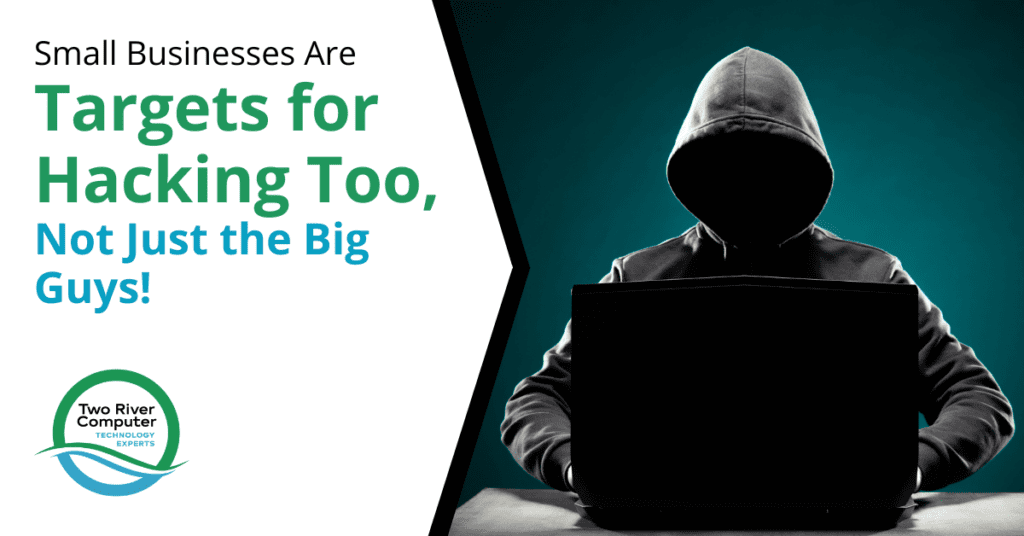
“What could a hacker possibly want that we have?” or “We’re too small for those ransomware attackers, they only go after the big companies.” These are some of the sentiments that can cost small business owners in Fair Haven and beyond because they’re not properly prepared.
Owners of smaller companies can have a false sense of security thinking they’re too small to be a target of a hacker. But they’re actually prime low-hanging fruit for cyber criminals.
More than 50% of all cyberattacks target small to mid-sized businesses. Small businesses also have a higher rate of targeted phishing than larger companies, with 1 in 323 emails being malicious.
And while dollar for dollar, a data breach may have a higher price tag for a larger company, smaller companies are typically hurt more because they don’t have as much capacity to absorb the costs.
A single phishing email, if acted upon by an unaware employee, can cost a small business as much as $100,000.
Small business owners that don’t have proper cybersecurity protections in place can suffer from a wide range of attack types, including:
- Ransomware
- Viruses
- Spyware and other malware
- Mobile app malware
- Phishing attacks
- Fileless malware
- Cloud account breaches
- Insider attacks
Why Do Hackers Care About Small Businesses?
Small Companies Typically Have Less Security Than Larger Companies
A hacker can spend a lot of time and effort trying to get a big payoff from a larger company, or they can spend a lot less effort hacking into several smaller companies.
Even if they have to hack into 25 small businesses to steal the equivalent amount of personal data from a user database, it can still be worth their time because of the difficulty of hacking into large enterprise systems.
Small businesses often don’t even put the standard best practices in place for their cybersecurity, like managed security or multi-factor authentication, which is why hackers consider them low-hanging fruit.
Every Business, No Matter How Small, Has Valuable Data to Steal
Even if you have a business with two employees, you still have things that a hacker can find worth their time to steal. A mistake many small companies make is not realizing this, and not protecting their network and data as they should.
Some of the data that any sized business has that can make a hacker money includes:
- Bank account & banking login
- SSN’s and other employee data that can be used for identity theft
- Your business FEIN and other information (can be used to take out loans in your company name)
- User logins for any type of cloud account
- Customer database with personally identifiable information (PII)
- Company or personal credit card number
What can hackers get for your personal information on the Dark Web?
- $65 for stolen online banking credentials
- $156 – $320 for a PayPal account login
- $12 – $20 for credit card details
Small Businesses Aren’t as Prepared for a Ransomware Attack
Ransomware has become a criminal enterprise, with large cybercrime cartels launching sophisticated attacks all the time against millions of small businesses.
Because small businesses tend to be less prepared for a ransomware attack (i.e. not having a full backup of their data), they are more likely to pay a ransom than a larger organization. This makes them prime targets.
Approximately 46% of small businesses have been targets of ransomware attacks and of those attacked, 73% have paid a ransom. A majority of those ransoms were in the $10,000 to $50,000 range.
Good Cybersecurity Building Blocks
You don’t have to be a large enterprise company to be able to put the good building blocks of cybersecurity in place to protect your business.
Good IT security means putting several layers in place that can protect your network and data from multiple attack types. Here are several of those important layers.
Next-Gen Firewall
A next-gen firewall keeps your network protected by monitoring all traffic and picking up on any suspicious threats. Advanced firewalls include AI capabilities to provide automated threat detection and response.
Antivirus/Anti-malware
All devices in your IT infrastructure should have the protection of a good antivirus/anti-malware.
Multi-Factor Authentication
Cloud account breaches are becoming more common because most businesses have transitioned their data to cloud interfaces. Multi-factor authentication is a vital safeguard to keep hackers from breaching user passwords.
Web Filtering
Phishing emails overwhelmingly use links to malicious sites instead of file attachments. Web filtering keeps users secure by blocking dangerous websites.
Patch & Update Management
A good deal of data breaches happen because a hacker’s code is exploiting a known software vulnerability, but one that the user never patched. It’s important to have a patch/update management program in place to keep all devices properly updated.
Secure Your Small Business from Threats with our Pro-Active Support (PAS) Program
Two River Computer’s expert technicians can ensure you have multiple layers of protection in place to keep your business and data secure. Our PAS program gives you peace of mind!
Contact us today to learn more. Call 732-747-0020 or reach us online.


